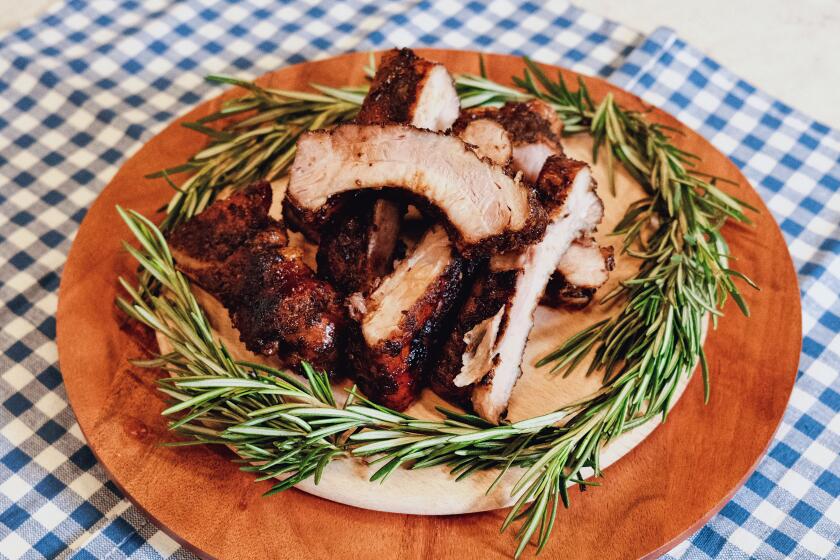Hungry for history at Clifton’s
- Share via
If you are going to celebrate the savory but shrinking legacy of cafeterias in the Los Angeles area, why not go to the ground zero of meatloaf, carrot salad and strawberry shortcake?
That was why about 70 hungry members of the Southern California Restaurant Historical Society gathered Saturday at Clifton’s Brookdale cafeteria, the landmark eatery that has been feeding downtown Los Angeles diners at reasonable prices in its simulated redwood forest setting since 1935.
Chris Nichols, an architectural historian who is the society’s president, said it is important to treasure Clifton’s because so many other cafeterias in the region have disappeared. Beadle’s in Pasadena closed six months ago, and other branches of Clifton’s have shut their doors over the years.
“I hate it when someone says they have a favorite old tiny restaurant, but they haven’t been there for 20 years. I want people to come and live it and enjoy while it is still here, while it is thriving and still alive,” Nichols said.
The mountain forest decor at Clifton’s Brookdale -- with a waterfall, a tableau of a family fishing for trout and a tiny inspirational chapel perched on a rocky ledge -- is beloved as an “over-the-top fantasy world,” Nichols said. “It’s incredible to have a total immersive environment from the ‘30s that you can just walk into for the price of a cup of jello.”
In a third-floor room decorated in a Victorian-era style, Nichols presented a slide show and talk on his new book, “The Leisure Architecture of Wayne McAllister,” about the designer of many popular carhop restaurants, hotels and nightclubs from the ‘20s to the ‘50s.
Other speakers Saturday included Times food writer Charles Perry, who attributed the rise of cafeterias in Los Angeles in part to their innovation of delivering food without a wait or waiter but with a selection that could be easily seen.
Cafeterias proved popular with the large number of conservative Midwestern immigrants, who enjoyed the hearty food and liquor-free atmosphere, Perry told the gathering. They became a center of social and political life in the ‘20s and ‘30s, but declined as older downtowns lost population to automobile-dominated suburbs and tastes changed, he said.
The biggest applause of the two-hour meeting erupted when Robert Clinton, whose grandfather Clifford Clinton founded the Clifton’s cafeteria chain, announced that last year his family finally bought the building at 648 S. Broadway after seven decades of leasing.
That will protect the restaurant from the rent increases and leasing disputes that contributed to the deaths of so many other cafeterias, he said.
Business has grown a bit recently from the new loft and condo residents in downtown, and Clinton thinks they are “going to be a very important element of our customer base going forward.”
In a region stuffed with the latest in sushi and pizza fads, nostalgia plays a part too at such surviving cafeterias as Clifton’s and at Arnold’s, a Long Beach institution founded in 1951.
“People will come came back after 30 years and say, ‘I remember eating this macaroni and cheese and apple pie.’ And the recipes are the same recipes we’ve used all these years,” Clinton said. “Maybe that’s part of the secret. People like things that are familiar. And they like things that don’t change.”
His family’s restaurant, which seats more than 600, was quite busy Saturday with non-historians, including many Latino families on shopping treks along Broadway.
Among the popular items were pear-lime jello, $1.49; strawberry shortcake, $2.39; a plate of beef noodles, $3.99; meatloaf with stuffed potatoes, $5.79; and roast turkey with dressing, $6.54.
After hours of discussion, members of the restaurant historical society were eager for lunch. Nichols, who is an editor at Los Angeles Magazine, went along the food line downstairs with enthusiasm. He loaded his tray with a lettuce salad with French dressing; a bowl of three-bean salad; an entree of sliced turkey with stuffing, mashed potatoes, gravy and cranberry sauce; pumpkin cream pie; and watermelon juice. The tab was $14.46.
More to Read
Eat your way across L.A.
Get our weekly Tasting Notes newsletter for reviews, news and more.
You may occasionally receive promotional content from the Los Angeles Times.











